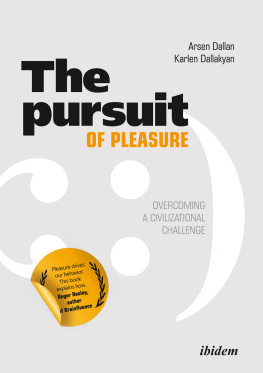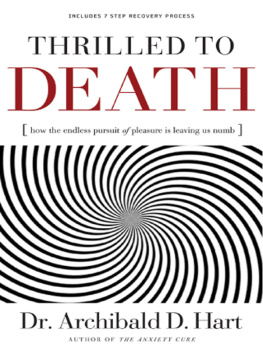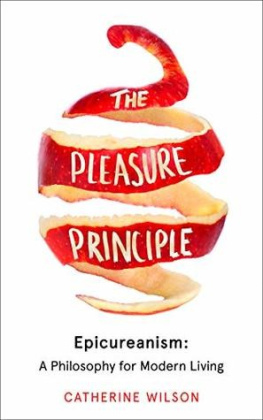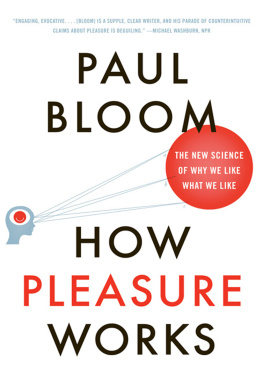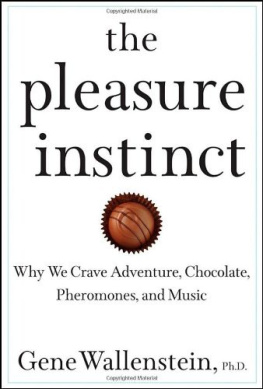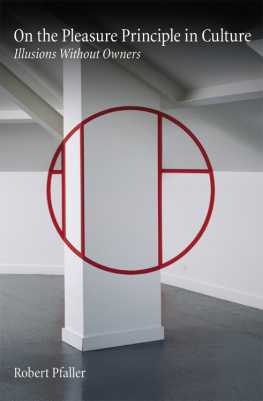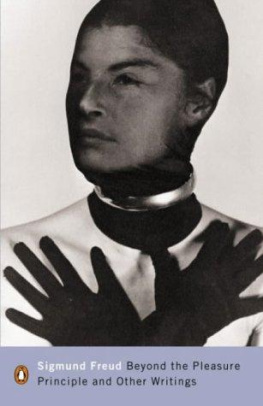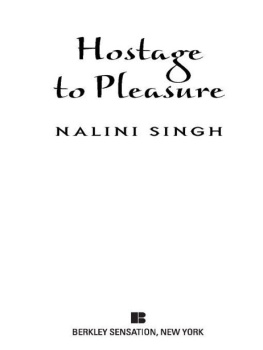Arsen Dallan - The Pursuit of Pleasure: Overcoming a Civilizational Challenge
Here you can read online Arsen Dallan - The Pursuit of Pleasure: Overcoming a Civilizational Challenge full text of the book (entire story) in english for free. Download pdf and epub, get meaning, cover and reviews about this ebook. year: 2016, publisher: Ibidem Press, genre: Science. Description of the work, (preface) as well as reviews are available. Best literature library LitArk.com created for fans of good reading and offers a wide selection of genres:
Romance novel
Science fiction
Adventure
Detective
Science
History
Home and family
Prose
Art
Politics
Computer
Non-fiction
Religion
Business
Children
Humor
Choose a favorite category and find really read worthwhile books. Enjoy immersion in the world of imagination, feel the emotions of the characters or learn something new for yourself, make an fascinating discovery.
- Book:The Pursuit of Pleasure: Overcoming a Civilizational Challenge
- Author:
- Publisher:Ibidem Press
- Genre:
- Year:2016
- Rating:3 / 5
- Favourites:Add to favourites
- Your mark:
- 60
- 1
- 2
- 3
- 4
- 5
The Pursuit of Pleasure: Overcoming a Civilizational Challenge: summary, description and annotation
We offer to read an annotation, description, summary or preface (depends on what the author of the book "The Pursuit of Pleasure: Overcoming a Civilizational Challenge" wrote himself). If you haven't found the necessary information about the book — write in the comments, we will try to find it.
This important book unveils how the pleasure principle has taken humanity hostage to the powers of branding and consumerism, steering our most basic desires. Radically re-evaluating the notion of pleasure and arguing for a deep societal change, it shows the way to a new humanist culture.
Arsen Dallan: author's other books
Who wrote The Pursuit of Pleasure: Overcoming a Civilizational Challenge? Find out the surname, the name of the author of the book and a list of all author's works by series.
The Pursuit of Pleasure: Overcoming a Civilizational Challenge — read online for free the complete book (whole text) full work
Below is the text of the book, divided by pages. System saving the place of the last page read, allows you to conveniently read the book "The Pursuit of Pleasure: Overcoming a Civilizational Challenge" online for free, without having to search again every time where you left off. Put a bookmark, and you can go to the page where you finished reading at any time.
Font size:
Interval:
Bookmark:
ibidem Press, Stuttgart
We'd like to would like to acknowledge all the experts who helped writing and forming this book: Michael Votinov ( RWTH Aachen University, Germany ), Alexis Belianin (High er S chool of Economics, Moscow), and Arina Skibinskaya ( j ournalist ).
Additionally we'd like to express our gratitude towards Roman Mandrick ( CEO of Active ), Michael Safran ( founder of Questomania , Israel ), Oleg Klepikov ( CEO of the Center for Applied Neuroeconomics and Behavioral Research ), and Maria Geld ( Plekhanov Russian University of Economics ) .
Arsen Dallan ,
Karlen Dallakyan
July 2016
This is not quite a common academic or mass-market book. As it has been co-authored by a doctor of philosophy, Professor Dallakyan, and Arsen Dallan, a corporate giant ' s top manager with a wealth of experience in applied marketing, the book is not merely a result of theoretical reflection and research but also a practical guide providing answers on how to change one ' s life. We can safely say that the book refers to both personal and public lives of all people.
The Ultimatum of Pleasure captures the nature and essence of the pleasure phenomenon both as a behavioral stimulus for all humans and as the most important determinant of the personal development of individuals and the shared human culture. Learning the mechanisms of pleasure management, humans can become their own masters, similarly to how behavioral marketing specialists manage consumer behavior and the societal development. As a matter of fact, this book reveals the essential transmutation of the 21st century ' s marketing by disclosing how it targets not the individual ' s needs but the pleasure seeking urges and has a long-term goal of managing these urges.
The natural and philosophical concepts of pleasure are discussed in the book. We will present and evaluate the major philosophical, psychological and physiological schools that interpret the phenomenon of pleasure in their own way. We will pay a particular attention to the behaviorist approach based on psycho-physiological experiments that illustrate the brain's response to pleasure.
Co-evolution of the human pleasure and degree of personal freedom is presented within the retrospective analysis. It is shown that rising above both biological and ego nature is a general line of the social evolution. Th is is the ultimate goal of the achievement of a human being, self-realization of the true human nature. The historical and genetic insight of the pleasure phenomenon illustrates the mood change in the society, various cultural attitudes and epochs in relation to pleasure. From the very beginning, when in the primitive society a human being was completely submissive to the pleasure principle and differed little from animals, the reader will advance in time and see how a new form of behavior put a ban on all pleasures, which was particularly obvious in the Medieval culture, when radically religious fanatics tried to put a person into the " Procrustean bed " of moral values. And, finally, we will show that emergence and development of capitalism led to the emancipation of pleasure from all moral restrictions. But that is not all, the most interesting is yet to come. We will help you, our reader, peek into the near future, where humanity will face the Ultimatum of Pleasure: rise above or degrade!
What does it mean? We will provide a detailed answer in the book.
In a word, however, it is a choice the evolution forces the humans to make. As individuals, we must either overcome the pleasure principle in our decision taking or become free from our primitive instincts and build a new humanistic culture, wherein pleasure is a personal reward for the intelligent decisions. Otherwise we will continue tormenting ourselves in stress from the expectation of pleasure we will never be able to feel or achieve. This, in the era of a consumer society, would degrade humans to the being-functions, whose only purpose is to support the market and social exchange.
The book provides the arguments to support the thesis that today there exist not merely a need, but also necessary conditions for the creation and development of a new culture, in which a person would not be motivated and driven by pleasure-seeking urges, but will be able to create the pleasures that are essential for the self-realization of our human and personal potential.
This present research, in fact, is a sort of the New Anthropological Paradigm Manifesto boding the appearance of a new Overman. The authors hope that through the resolution of the Ultimatum of Pleasure the mankind would not slide into the Nietzsche ' s Man-God era, but would rather start the new God-Human epoch, wherein, free from the pleasure principle, people will direct all their energy to actualize the true human nature.
We hope our readers will enjoy the reading and learning adventure.
N ature and Essence
of the Pleasure P henomenon
Any research requires definitions of the researched phenomena. For the purposes of this book we broadly define pleasure as a feeling of joy, of satisfaction humans receive from pleasant sensations, experiences, and thoughts. It is a positive emotion accompanying satisfaction of requirements, gratification of needs and desires.
French philosopher and psychoanalyst Jacques Lacan equates pleasure with dependence, as far as " pleasure is linked not with idleness, but with depe ndence or erection of desire " .
Many psychologists associate pleasure with a release from such erection of desire, weight, tensions, dearth of desire. It means that the pleasure provides either realization of desire or absence of it and, accordingly, absence of tensions itself. This view is in line with our idea concerning the usage in current behavioral marketing of the pleasure as a means of the consumers ' dependence on their desires, or rather as a means of managing the consumers ' behavior.
In his seminal work " The Use of Pleasure, " Michel Foucault points out a rather unusual aspect of the plea sure as " practice of the self " , meaning that humans, while realizing their pleasures, form and develop themselves. However, the practice of using the pleasure for behavioral marketing purposes, in our view, can be defined as " practice of the other. " It is a sort of the " pleasure engineering. " Foucault further considers, in terms of human sexuality, ways of directing and regulating people ' s behavior by means of pleasures in various cultures. He underlines that religion, morality and rights had a special control over humans ' experiencing pleasures, and to be more exact, over the ways of pleasure realization. Highlighting the strictness of the ancient laws, Foucault (1990) states,
Although the necessity of respecting the law and the customs was very often underscored, more important than the content of the law and its conditions of application was the attitude that caused one to respect them. The accent was placed on the relationship with the self that enabled a person to keep from being carried away by the appetites and pleasures, to maintain a mastery and superiority over them, to keep his senses in a state of tranquility, to remain free from interior bondage to the passions, and to achieve a mode of being that could be defined by the full enjoyment of oneself, or the perfect supremacy of oneself over oneself. (p. 304)
Today such a function of external control over pleasures is shifting more and more to marketers, who became aware of the earning power of such manipulation. However, before discussing the modern state of affairs, we will begin with the genesis of the pleasure as a concept.
To understand such a complicated phenomenon as pleasure we invite you to travel in time to the gorgeous gardens of the Epicurean school. Here, among date palms and fig trees you can find students who arrived to the school from all corners of Greece. At the lectern you can see the Teacher himself, a son of a warrior, born in Samos, an honorable Athens citizen, a philosopher, that is Epicurus. He says that pleasure is the supreme blessing, but he frowns for some reason as if he apprehends that his words will be misinterpreted by his pupils. Although no, he does not frown, it is simply the sun that blinds him. The philosopher steps into a tree shadow and continues his lecture with a smile on his lips.
Font size:
Interval:
Bookmark:
Similar books «The Pursuit of Pleasure: Overcoming a Civilizational Challenge»
Look at similar books to The Pursuit of Pleasure: Overcoming a Civilizational Challenge. We have selected literature similar in name and meaning in the hope of providing readers with more options to find new, interesting, not yet read works.
Discussion, reviews of the book The Pursuit of Pleasure: Overcoming a Civilizational Challenge and just readers' own opinions. Leave your comments, write what you think about the work, its meaning or the main characters. Specify what exactly you liked and what you didn't like, and why you think so.

